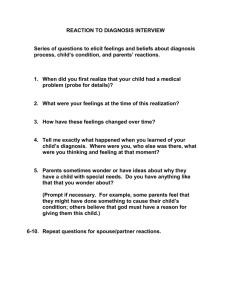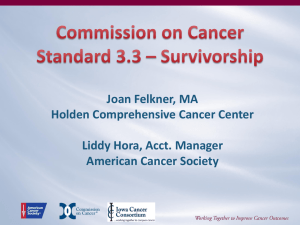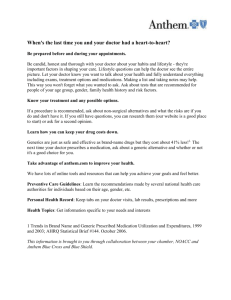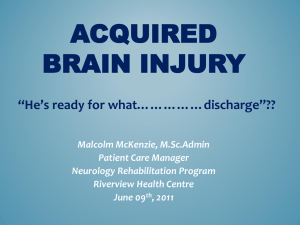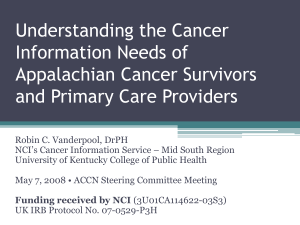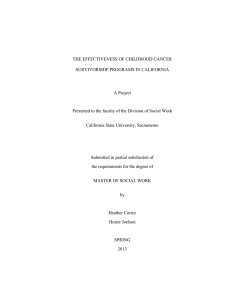Who are the main players to help in coping with cancer?
advertisement
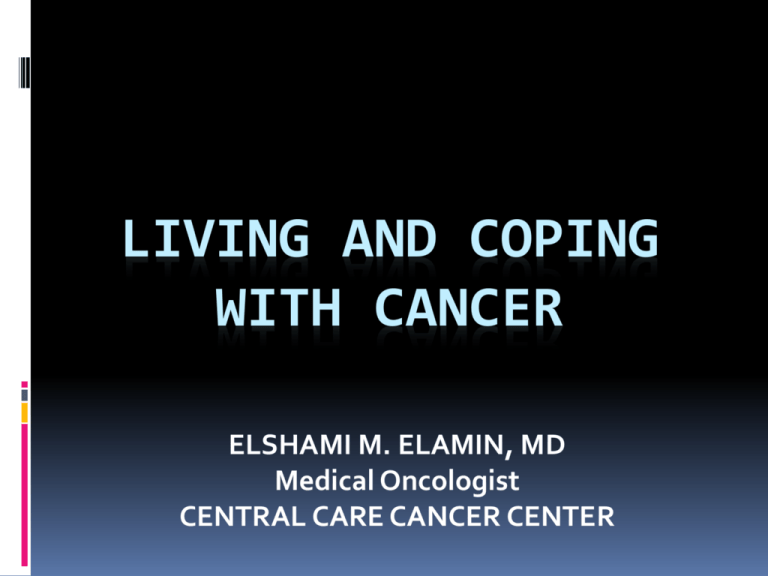
LIVING AND COPING WITH CANCER ELSHAMI M. ELAMIN, MD Medical Oncologist CENTRAL CARE CANCER CENTER INTRODUCTION When doctor says the word “cancer”: People can be overwhelmed Cancer diagnosis often brings: Disbelief Sadness Anxiety Anger Feelings of fear Confusion Feelings of helplessness INTRODUCTION Cancer diagnosis may lead to a change in: Person's priorities: Relationships Career Lifestyle COPING WITH CANCER WHAT CANCER PATIENT NEEDS? Help to answer common questions about cancer. Help to feel more in control of his/her health. WHO ARE THE MAIN PLAYERS TO HELP IN COPING WITH CANCER? Patient Caregiver Health care provider ROLE OF THE PATIENT “FIGHTING” FIRST DOCTOR VISIT When you meet your health care team: Learn the medical terms Will help making informed decisions about cancer treatment Ask for a simpler explanation when don’t understand something Ask to see: Drawings Pictures X-Rays Seeking information Understand your disease Process of diagnosis Treatment options REMEMBER: During the initial visit, absorbing the news of the cancer and its unfamiliar medical language may be difficult and overwhelming SOME PATIENTS WANT TO KNOW MORE INFORMATION WHILE OTHERS LESS When you get home: Try to take care of yourself while coping with this news Start learning about your disease Seek the support of family, friends, and others Find other ways to express your feelings Write down your questions for the next doctor visits GET ORGANIZED Because: In a short period: Various doctors’ visits Gather a large amount of paperwork Test results Personal notes Talking to insurance Create a system Back again to see your health care team: Ask your questions again May bring a family/friend Not only be supportive, but can also help listen to and remember information Being an informed, involved patient is helpful to you and your health care team in forming a partnership in your care. Tell them how you prefer to be given information about your diagnosis, treatment, and prognosis. Don't be afraid to ask questions or to let your doctor know that you don't know what questions to ask. The following questions may be appropriate to ask your health care team: What is the exact type and name of the cancer I have? How was it diagnosed? What tests were taken and what did they show? Will I need additional tests? What stage is the cancer and what does that mean? What are my treatment options? What are the possible side effects of this treatment option, both in the short term and the long term? What clinical trials are open to me? Who will be coordinating my overall treatment and follow-up care? Who will be part of my health care team, and what does each member does? If I’m worried about managing the costs related to my cancer care, who can help me with these concerns? What support services are available to me and my family? Second opinion A second opinion is standard practice in medical care Understanding your emotions Illness changes our relationship to the world. Remember: There will be days when you cannot make yourself feel hopeful. That is normal, especially if you feel physically sick or tired. Get support Sharing fears and anxieties with family or friends, counselors, support groups: Strengthen patients emotionally, and perhaps even physically. However, some may express their feelings in other ways: Writing Reading Painting Praying Anxiety and depression: If you find yourself not interested in normal activities for more than a few weeks, talk to your doctor. Fear of recurrence Maintain your schedule of follow-up visits Many cancer survivors describe feeling scared and nervous These feelings may ease with time To reduce a anxiety: Discuss with your doctor: The actual risk of recurrence The symptoms to report Health care provider ROLE OF HEALTH CARE PROVIDER FIRST PATIENT VISIT “Doctor’s most difficult duties” Breaking Bad News: Confirm medical facts Review relevant clinical data Arrange adequate time Privacy Allow for Questions Allow for silence and tears Emotionally prepare for the encounter offer realistic hope Breaking Bad News Keep in mind: 1. Socio-cultural differences: Family barrier What and how much information is provided Participation in medical decision-making Asian pts prefer: Relatives be present more than Westerners do To discuss their life expectancy less than Westerners 2. Religion and believes Breaking Bad News Patients' preferences for communication: Differ based on: Gender Age Level of education Younger, female, highly educated patients desire to receive: As much detailed information as possible Emotional support After the bad news Doctors first focus on: 1. The physical effects of the disease 2. Treatment Treatment options: Help patients make more informed decisions about their health care Patients also should know the short-term and long-term side effects of their treatment to anticipate how their needs may change in the future. Treatment Side Effects Anemia Appetite Loss Bleeding Problems Bowel Obstruction Clotting Problems Cognitive Problems Constipation Diarrhea Difficulty Chewing Difficulty Swallowing Dry Mouth Fluid Retention Fatigue Fluid Around the Lungs Hormone Deprivation Symptoms Menopausal Symptoms Infection Confusion Mouth Sores Nausea and Vomiting Nervous System Side Effects Neutropenia Pain Sexual Dysfunction Shortness of Breath Skin Changes Skin Reactions to Targeted Therapies Sleeping Problems or Insomnia Fluid in the Abdomen Fluid in the Arms or Legs or Lymphedema Hair Loss or Alopecia Hand-Foot Syndrome Hypersomnia or Somnolence Syndrome or Nightmares Superior Vena Cava Syndrome Taste Changes Thrombocytopenia Weight Gain Headaches Weight Loss Caring for the Whole Patient The health care team should address the psychosocial effects of the cancer: Lack of information and support Emotional difficulties Depression and anxiety Lack of transportation Disruptions to work, school, and family life Paying for medical bills Emotional support Patients with untreated depression or anxiety: Less likely to take their medication More likely to withdraw from family and others offering support Emotional support Resources and services: Peer support groups (Victory in the Valley) Individual or group counseling Medication Lifestyle changes Part of cancer treatment plan may includes: 1. 2. 3. 4. Change in lifestyle and habits Change in physical activity levels Change in diet Quit smoking Managing life disruptions Change in work schedules or stop working The Americans with Disabilities Act and the Family and Medical Leave Act provide legal protection for disruptions in work due to cancer treatment Trouble performing daily activities Home care What to expect after completing treatment What treatment patient received Schedule for follow-up Learn the definitions of medical terms Keep a complete record of medical care Manage Side Effects Late Effects Problems from surgery Vision problems Problems from radiation Heart problems Bone, joint, and muscle problems Endocrine system problems Nerve problems Digestive problems Memory difficulties Secondary Cancers Dental problems Lung problems Late Effects Emotional difficulties Coping with interpersonal relationships Changes to body image Sexuality Returning to the workplace Obtaining health insurance Fatigue Anemia Pain Sluggish thyroid gland Lack of physical strength Depression Making Positive Lifestyle Changes Improve diet: More fruits and vegetables Quitting smoking Establishing better sleeping habits Reevaluate lifestyle and make positive changes: Reduce stress Gain confidence Discover new interests Find greater meaning in life Feel more in control !!Talking With Someone Who Has Cancer!! Sometimes it may be difficult to know: What to say What not to say How to be sensitive How to remain supportive at all times Sometimes it's best to just listen …… OR Talk about the usual and familiar topics; not every conversation needs to be about cancer WAYS TO SHOW YOUR SUPPORT Be Respectful Respect patient need to be alone at times. He or she may need to vent frustrations or anger, which is normal. Try not to take it personal. Choose your words carefully It's impossible to truly know what it's like to be diagnosed with cancer unless you have been diagnosed Avoid phrases, such as: I know what you’re going through … I know how you must feel … At the Time of Bad News Avoid making statements, such as Everything will be fine … It's okay … Statements like this may not only prove to be false May also make the patient withdraw from accepting your support because they cannot express their true concerns Show support with your body language Keep eye contact Listen attentively, and avoid distractions Allow for periods of silence Smile and touch appropriately Help the patient stay involved Keep the balance between being supportive and keeping things the same as before cancer diagnosis. Some people with cancer cope best by staying involved and continuing old routines as much as possible. CANCER SURVIVORS Defining survivorship Two common definitions: Having no disease after the completion of treatment The process of living with, through, and beyond cancer Other definition: Acute survivorship: The time when a person is diagnosed and/or in treatment Extended survivorship: The time immediately after treatment is completed Permanent survivorship: A longer-term period Survivorship is a unique journey for each person Survivors appreciate life more and gain a greater acceptance of self Some survivors become anxious about their health and uncertain of how to cope with life after treatment Survival statistics Cancer survivors in USA: 3 million in 1971 12 million today 15% of survivors were diagnosed >20 years ago Most cancer survivors today are age 65 or older 68% of cancer patients today are expected to live at least five years Survivors’ cancers: Breast 22% Prostate 20% CRC 9% GYN 8% Increase in survival rates Improved screening and early detection: Mammography Colonoscopy PSA Pap smear Improvements in treatment: More effective treatment of side effects Anti-emetics Growth factors Antibiotics The development of targeted therapies REHABILITATION Rehabilitation Cancer rehabilitation Obtain the best physical, social, psychological, and work-related functioning during and after cancer treatment. The goal of rehabilitation: Regain control over many aspects of live Remain as independent and productive as possible How cancer rehabilitation help? Improve the quality of life for patient and family Patient become more independent and less reliant on caregivers Helping patient adjust to actual, perceived, and potential losses due to cancer and cancer treatment Reducing sleep problems Lowering the number of hospitalizations Cancer rehabilitation services Patient and family education and counseling Pain management techniques and medications Nutritional counseling Exercise programs to help to build strength, endurance, and mobility Smoking cessation education and support programs Assistance with activities of daily living (ADLs)
